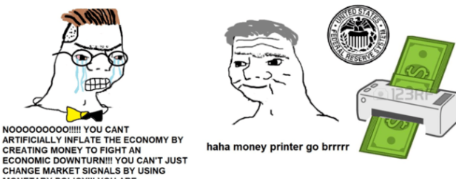Fiat currencies
Crypto Currencies
What Does Haha Money Printer Go Brrrrr Mean?
What Is the Origin of the Go Brrr Meme?
"Go brrr" is a phrase that has been popularized through memes, with its original use being in reference to the A-10 Warthog military aircraft's loud "brrrt" sound when firing its powerful machine guns. The phrase gained even greater notoriety with the Money Printer Go Brrr meme in 2020, which depicted the U.S. Federal Reserve printing money to combat the economic downturn caused by the coronavirus. Since then, "go brrr" has been used in earnest and sarcastically to refer to solutions to problems that are either simple or inadequate problems, respectively.
What Is Haha Money Printer Go Brrrrr?
The "Haha Money Printer Go Brrr" meme gained popularity in early 2020, showing a younger man yelling at an older Federal Reserve executive when he is printing money. The meme was created in response to the U.S. Federal Reserve's decision to inject $1.5 trillion into the economy as a result of the COVID-19 pandemic. This intervention was meant to increase stock market liquidity and stabilize the economy.
This meme has been spread by those who are critical of the government's ability to print money and use it to address economic crises. The meme has resonated with those who worry about the inflationary effects of fiat money systems and the consequences of governments intervening in economic matters. It expresses the idea that governments can create money "out of thin air" with potentially disastrous effects. Also, The crypto community often references the "Haha Money Printer Go Brrrrr" meme due to the fact that cryptocurrencies aim to challenge existing financial systems.

What is Quantitative Easing?
Government intervention in the economy and increasing the money supply in the country is also called Quantitative Easing(QE). Quantitative Easing (QE) is a complex process that involves the Federal Reserve purchasing bonds from commercial banks, rather than simply printing money as some may suggest. The Federal Reserve evaluates the need for QE during their bimonthly meetings and may decide to reduce interest rates in the process. However, the interest rates that are lowered are those that apply to the borrowing of money by commercial banks from the Fed. This reduction in interest rates incentivizes commercial banks to borrow more money and sell more bonds to the Fed, thereby increasing the liquid money supply in the banking system. Lower borrowing costs are then passed on to customers and businesses, leading to increased borrowing and subsequent economic activity as the borrowed funds are used to create demand among consumers and investments by businesses.
Reasons for Money Printed?
- Governments and central banks print money to increase the amount of money in circulation to reduce interest rates and borrowing costs, in order to spur economic activity.
- To help the government fund its budget deficits. Governments may print money to finance their spending programs, particularly during times of economic crisis, such as wars or recessions.
- Meeting the Demand for Cash. As the economy grows, the demand for cash increases. Governments print money to meet this demand and ensure that there is enough cash available for people to use in their daily transactions.
Why Did the Haha Money Printer Go Brrrrr?
Between 2019 and 2020, the Federal Reserve started lowering interest rates, which means it became cheaper for people to borrow money. This continued until March 2020 when they suddenly reduced the rates a lot from 1.75% to 0.25%.
On March 15, 2020, the Federal Reserve said they would buy $700 billion worth of government debt bonds and mortgage-backed securities from banks in the US over the next few months. They did this because the economy was doing very badly because of COVID-19. The idea was that if they gave people more money, they would keep spending and investing, which would help the economy do better and lessen the impact of COVID-19. This plan worked.
In addition to traditional stock markets, policies have also affected the crypto industry. Bitcoin skyrocketed from around $4,800 to nearly $63,000, while other altcoins such as Ethereum saw an incredible rise from under $200 in March 2020 to $3,800 by May 2021.
Closing Thoughts About Money Printer Go Brrrrr
While it is true that reducing interest rates can spur economic activity by encouraging borrowing and investment, it is important to note that printing too much money to achieve this goal can lead to inflation and reduce the value of the currency in the long term.
Similarly, while governments may use money printing to fund their budget deficits, this approach can also lead to inflation and reduce confidence in the currency if it is done excessively.
Therefore, it is important for central banks and governments to strike a balance between using monetary policy to stimulate economic activity and maintaining the value of the currency over the long term. This requires careful consideration of the economic conditions, including inflation, unemployment, and economic growth, as well as the potential impact of policy decisions on the broader economy.
Stay tuned to CoinCarp Social Media and Discuss with Us:
- Venga Introduces Euro IBAN Accounts to Streamline Fiat-to-Crypto Transfers in the EU Beginner Apr 15, 2025 2m
- 8 Best Crypto Sports Betting Sites in Canada [2025] Beginner Apr 14, 2025 9m
- 8 Best Crypto Sports Betting Sites in the UK [2025] Beginner Apr 14, 2025 8m
- Cryptocurrency Market Cap Trends: Analyzing the Growth from 2010 to 2025 Beginner Apr 11, 2025 4m